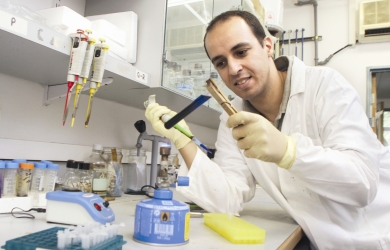| | 12 September, 2012
| | A carefully scheduled high-fat diet resets metabolism and prevents obesity, in Hebrew University research | | Mice on a scheduled high-fat diet had a lower body weight than mice on an unscheduled low-fat diet with the same number of calories |
 | | Prof. Oren Froy of the Hebrew University’s Robert H. Smith Faculty of Agriculture, Food and Environment (Photo: Sasson Tiram) |
|
New research from the Hebrew University of Jerusalem shows that a carefully scheduled high-fat diet can lead to a reduction in body weight and a unique metabolism in which ingested fats are not stored, but rather used for energy at times when no food is available.
The research was conducted by Prof. Oren Froy along with Prof. Zecharia Madar, research student Yoni Genzer and research fellow Dr. Hadas Sherman at the Institute of Biochemistry, Food Science and Nutrition, at the Hebrew University’s Robert H. Smith Faculty of Agriculture, Food and Environment. The results were published in FASEB Journal under the title Timed high-fat diet resets circadian metabolism and prevents obesity.
Previous research has established that disrupting mammals’ daily rhythms, or feeding them a high-fat diet, disrupts metabolism and leads to obesity. The researchers wanted to determine the effect of combining a high-fat diet with long-term feeding on a fixed schedule. They hypothesized that careful scheduling of meals would regulate the biological clock and reduce the effects of a high-fat diet that, under normal circumstances, would lead to obesity.
For 18 weeks they fed a group of mice a high-fat diet on a fixed schedule (eating at the same time and for the same length of time every day). They compared these mice to three control groups: one that ate a low-fat diet on a fixed schedule, one that ate an unscheduled low-fat diet (in the quantity and frequency of its choosing), and one that ate an unscheduled high-fat diet.
All four groups of mice gained weight throughout the experiment, with a final body weight greater in the group that ate an unscheduled high-fat diet.
The mice on the scheduled high-fat diet had a lower final body weight than the mice eating an unscheduled high-fat diet. But surprisingly, the mice on the scheduled high-fat diet also had a lower final body weight than the mice that ate an unscheduled low-fat diet, even though both groups consumed the same amount of calories.
In addition, the mice on the scheduled high-fat diet exhibited a unique metabolic state in which the fats they ingested were not stored, but rather utilized for energy at times when no food was available, such as between meals.
According to Prof. Froy, “Our research shows that the timing of food consumption takes precedence over the amount of fat in the diet, leading to improved metabolism and helping to prevent obesity. Improving metabolism through the careful scheduling of meals, without limiting the content of the daily menu, could be used as a therapeutic tool to prevent obesity in humans.”
|
|


